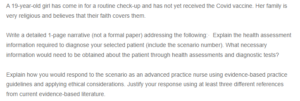The Role of Ethics and Religion in Health Assessment
As an advanced practice nurse, I often expect to come across patient cases and situations that challenge my ability to make ethical decisions. I recently experienced a similar situation (CASE STUDY 6) in which a 19-year-old girl had come to the clinic for a routine check-up. The girl had not yet received the Covid vaccine. Her family is very religious and believes that their faith covers them. In such a case, it is hard to collect health assessment information to recommend the next healthcare actions. The assessment information necessary for a diagnosis of the 19-year-old girl should include the information on the girl’s as well as the parent’s medical history. This could include information identifying whether the girl and her family have any known allergies and if the girl has been or is on any medication. Although controversial based on the patient’s religious beliefs, I would still request information on their vaccination history and whether the patient or her family has any underlying conditions. Additionally, I would also require more information on the girl’s perspective on her parents and family’s religious and cultural beliefs on vaccines. Additionally, the information necessary for health assessments and diagnostic tests would include information from clinical tests such as antigen and serology tests.
Overcoming major ethical conflicts and dilemmas, such as in the scenario above, requires the application of appropriate evidence-based methods. As an APN, a major part of my training was on how to utilize the available evidence best to overcome such ethically challenging situations. In fact, the development of EBP (evidence-based practice) competencies as a nurse is a major requirement for the delivery of quality care, achieving improved care safety and patient outcomes (Bell, 2020). The EBP guidelines help guide the assessment exercise and ethically overcome the ethical dilemma in the case of the 19-year-old patient. According to Tomkins and Bristow (2023), the application of EBP and ethics in care can help recast a problem and turn it into an opportunity. Accordingly, my response to this scenario would be to first establish a good relationship with the patient and her family. This involves understanding and appreciating the patient’s religious and cultural background, world views, previous experiences, and any concerns they may have (Retz et al., 2021). Therefore, I would appreciate the family’s religious beliefs and how they influence their views on vaccines. Arguably, cultural sensitivity is a factor in developing effective patient-nurse relationships as well as the delivery of culturally congruent care (Vaismoradi et al., 2022).
The next step would be to educate the patient and her family on the need for medical methods of disease prevention and treatment, such as vaccines. In this case, I would address how religious beliefs influence our views on medications and vaccines, the significant role vaccines play in strengthening our immunity, and how failure to vaccinate increases the risks of infections. I would also focus on explaining to them the risks vaccines bear as well as the safety and effectiveness of vaccines in disease prevention and eradication. I would consider presenting evidence on the same. Notably, most vaccine hesitancy is fueled by exaggerated myths and misconceptions held against vaccines due to misinformation (Bates et al., 2022). Patient education and providing information on vaccines can significantly lead to vaccine uptake (Anderson & Bryson, 2020). Therefore, my response to the situation as an APN would be to establish a strong relationship with the girl and her family by being culturally sensitive and educating them to address any vaccine misconceptions based on their religious beliefs.
References
Anderson, P., & Bryson, J. (2020). Confronting vaccine hesitancy: What nurses need to know. Nursing, 50(8), 43–46. https://doi.org/10.1097/01.NURSE.0000668436.83267.29
Bates, B. R., Villegas-Botero, A., Costales, J. A., Moncayo, A. L., Tami, A., Carvajal, A., & Grijalva, M. J. (2022). COVID-19 Vaccine Hesitancy in Three Latin American Countries: Reasons Given for Not Becoming Vaccinated in Colombia, Ecuador, and Venezuela. Health Communication, 37(12), 1465–1475. https://doi.org/10.1080/10410236.2022.2035943
Bell, S. G. (2020). Evidence-Based Practice Competencies for RNs and APNs: How Are We Doing? Neonatal Network, 39(5), 299–302. https://doi.org/10.1891/0730-0832.39.5.299
Retz, W., Ginsberg, Y., Turner, D., Barra, S., Retz-Junginger, P., Larsson, H., & Asherson, P. (2021). Attention-Deficit/Hyperactivity Disorder (ADHD), antisociality, and delinquent behavior over the lifespan. Neuroscience & Biobehavioral Reviews, 120, 236–248. https://doi.org/10.1016/J.NEUBIOREV.2020.11.025
Tomkins, L., & Bristow, A. (2023). Evidence-based practice and the ethics of care: ‘What works’ or ‘what matters’? Human Relations, 76(1), 118–143. https://doi.org/10.1177/00187267211044143/ASSET/IMAGES/LARGE/10.1177_00187267211044143-FIG1.JPEG
Vaismoradi, M., Fredriksen Moe, C., Ursin, G., & Ingstad, K. (2022). Looking through racism in the nurse–patient relationship from the lens of culturally congruent care: A scoping review. Journal of Advanced Nursing, 78(9), 2665–2677. https://doi.org/10.1111/JAN.15267
ORDER A PLAGIARISM-FREE PAPER HERE
We’ll write everything from scratch
Question

The Role of Ethics and Religion in Health Assessment
A 19-year-old girl has come in for a routine check-up and has not yet received the Covid vaccine. Her family is very religious and believes that their faith covers them.
Write a detailed 1-page narrative (not a formal paper) addressing the following:· Explain the health assessment information required to diagnose your selected patient (include the scenario number). What necessary information would need to be obtained about the patient through health assessments and diagnostic tests?
Explain how you would respond to the scenario as an advanced practice nurse using evidence-based practice guidelines and applying ethical considerations. Justify your response using at least three different references from current evidence-based literature.


